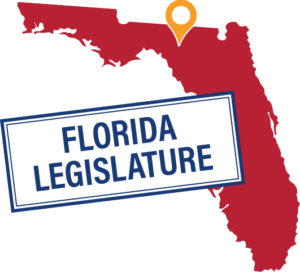RISING COST OF LITIGATION IN THE STATE
 Nuclear Verdicts Drive Up Cost of Litigation
Nuclear Verdicts Drive Up Cost of Litigation
From 2010 to 2019, Florida produced the most nuclear verdicts (213) of any state in the country according to a recent study by the U.S. Chamber. The 213 verdicts totaled $35 billion. When the number of Florida’s nuclear verdicts is compared to population, the state fares even worse. Florida had, by far, the most nuclear verdicts per capita over the 10-year span. Florida barely edged out California (211) for the top spot; how- ever, the Sunshine State has almost half the population of the Golden State, making its No. 1 ranking even more concerning. Nearly two thirds of Florida’s nuclear verdicts in personal injury and wrongful death cases were in product liability and auto accident cases, which is far above the national average.
 Two recent judgments levied against trucking companies exemplify the nuclear verdict risk for commercial drivers facing a personal injury lawsuit in Florida. In 2020, a jury delivered a $411 million verdict against Top Auto for a highway collision caused by one of the company’s truck drivers. In a similar case decided last year, another jury handed out a $1 billion verdict, inflated by $900 million in punitive damages.
Two recent judgments levied against trucking companies exemplify the nuclear verdict risk for commercial drivers facing a personal injury lawsuit in Florida. In 2020, a jury delivered a $411 million verdict against Top Auto for a highway collision caused by one of the company’s truck drivers. In a similar case decided last year, another jury handed out a $1 billion verdict, inflated by $900 million in punitive damages.
The prevalence of nuclear verdicts in Florida can be attributed to a handful of issues including inflated medical damages, the abuse of letters of protection, and large punitive damages awards. According to the
U.S. Chamber report, “Florida is also more prone to punitive damage awards than other states. Forty per- cent of nuclear verdicts in Florida included a punitive damage element compared to 26% nationally.”
Trial Lawyer Advertisements Fill The Airwaves
Trial lawyers are well aware of the Florida courts reputation for nuclear verdicts, and as a result, spend hundreds of millions of dollars on advertising trying to find their next “goose that lays the golden egg.”
From 2017-2021, viewers in Florida saw the most local legal services ads on television than viewers in any other state and trial lawyers spent more money on these ads than in any other state. During this five- year span, trial lawyers spent over $885 million on 9.35 million local advertisements on television, radio, and outdoor billboards and signs. Between January and August 2022, trial lawyers spent $94.6 million on more than 1.03 million local television ads alone.
Inflated Medical Damages And Letters Of Protection
Plaintiffs’ lawyers in Florida have long abused what are known as “letters of protection” to inflate damages for medical care. Letters of protection are agreements between a person who needs medical care, his or her lawyer, and a healthcare provider under which the healthcare provider agrees to not seek to collect a fee for medical treatment through the patient’s insurance coverage, but instead wait to collect out of an expected settlement or judgment. Letters of protection can serve a legitimate purpose when a person is uninsured and unable to pay for medical expenses. However, some Florida lawyers recommend that their clients avoid using their insurance to cover medical expenses but rely on a letter of protection.
Under Florida law, at trial, jurors only hear evidence of the initially invoiced amount of medical expenses, which is essentially a “sticker price” that is often three or more times the amount that is ultimately accepted by the healthcare provider as full payment. After a verdict, Florida law requires judges to adjust the award
to reflect the actual amount of medical expenses paid and accepted, a process called a “set off.” Florida’s personal injury lawyers often use letters of protection to avoid this set off. By avoiding submission of treatment invoices for payment until after trial, there is no amount paid for a judge to set off the award.
In a prime example, a plaintiff in a case in Florida slipped and fell in a grocery store, injuring both knees, requiring identical surgeries on each knee. For the first knee surgery, the plaintiff used health insurance, and was billed $19,000 by the doctor but the total amount actually accepted as full payment was $3,400. However, the second knee surgery was performed under a “letter of protection,” resulting in $59,000 billed by and owed to the surgery center.
This type of abuse benefits no one but the lawyers and the medical clinics that may be in cohorts with them. The lawyers get to inflate the damage award and collect a larger contingency fee. The medical pro- vider gets paid a rate that is much higher than market value. The plaintiff, however, has these high rates taken from his or her share of the judgment, even if they would have been covered by insurance.
Mixed Bag from the Courts
The Florida Supreme Court issued a positive decision requiring accuracy in damages in Dial v. Calusa Palms Master Ass’n (2022), highlighted later in the Points of Light section. The Court established that plaintiffs whose past medical expenses were paid by federal programs such as Medicare can only admit into evidence the amounts actually paid, not the fictitious amounts that no one is actually responsible to pay.
While the Florida Supreme Court once again issued a commonsense decision, trial courts across the state have not been so fair and balanced. For example, in September, Orange County Circuit Court Judge Kevin B. Weiss precluded a defense expert from testifying about reasonable and customary hospital bills at trial. The defense sought to use the expert’s testimony to demonstrate that the requested medical expenses did not conform to standard medical industry pricing.
The expert in question founded a medical billing service and has testified as a billing expert in numerous personal injury cases. Using her usual methodology, the expert prepared a report demonstrating the requested medical expenses were far greater than fees charged by other local hospitals for comparable treatment.
Despite having ample experience and hard evidence to support her opinion, Judge Weiss held that the expert had not demonstrated that “she can provide reliable, trustworthy testimony” under the standard for admission of expert testimony. Other Florida trial court judges also have prevented medical billing experts from exposing inflated charges.
Legislation can ensure that jurors receive accurate information on the actual value of medical expenses and prohibit abuse of letters of protection. The legislature also could place reasonable constraints on subjec- tive and unpredictable noneconomic damage awards, which are particularly important for preserving access to affordable medical care.



 Nuclear Verdicts Drive Up Cost of Litigation
Nuclear Verdicts Drive Up Cost of Litigation Two recent judgments levied against trucking companies exemplify the nuclear verdict risk for commercial drivers facing a personal injury lawsuit in Florida. In 2020, a jury delivered a
Two recent judgments levied against trucking companies exemplify the nuclear verdict risk for commercial drivers facing a personal injury lawsuit in Florida. In 2020, a jury delivered a  PROPERTY INSURANCE LITIGATION REFORM. As part of a special session, the Florida Legislature passed and Governor DeSantis
PROPERTY INSURANCE LITIGATION REFORM. As part of a special session, the Florida Legislature passed and Governor DeSantis 

